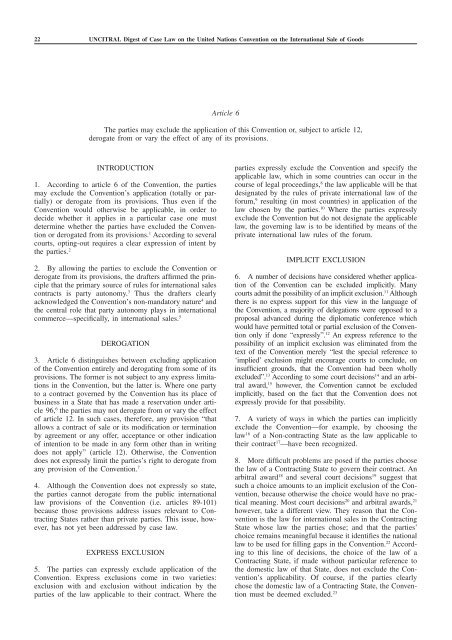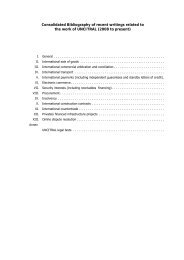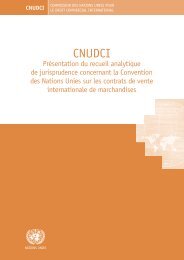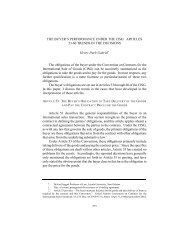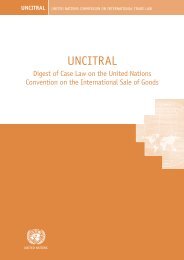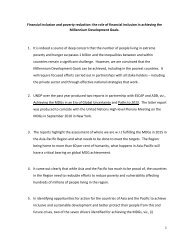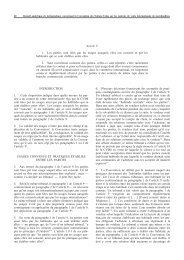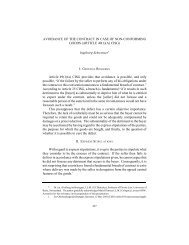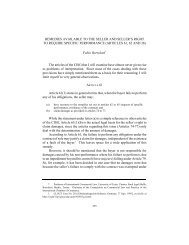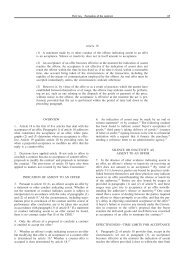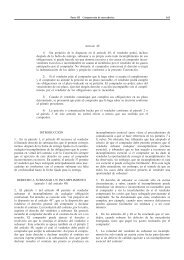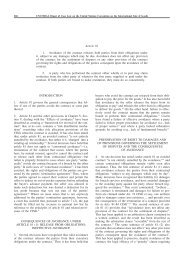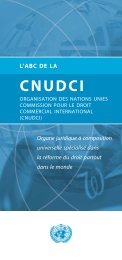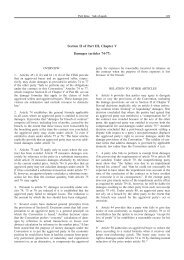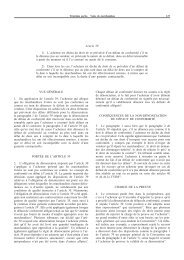Article 6 The parties may exclude the application of this ... - uncitral
Article 6 The parties may exclude the application of this ... - uncitral
Article 6 The parties may exclude the application of this ... - uncitral
Create successful ePaper yourself
Turn your PDF publications into a flip-book with our unique Google optimized e-Paper software.
22 UNCITRAL Digest <strong>of</strong> Case Law on <strong>the</strong> United Nations Convention on <strong>the</strong> International Sale <strong>of</strong> Goods<br />
<strong>Article</strong> 6<br />
<strong>The</strong> <strong>parties</strong> <strong>may</strong> <strong>exclude</strong> <strong>the</strong> <strong>application</strong> <strong>of</strong> <strong>this</strong> Convention or, subject to article 12,<br />
derogate from or vary <strong>the</strong> effect <strong>of</strong> any <strong>of</strong> its provisions.<br />
INTRODUCTION<br />
1. According to article 6 <strong>of</strong> <strong>the</strong> Convention, <strong>the</strong> <strong>parties</strong><br />
<strong>may</strong> <strong>exclude</strong> <strong>the</strong> Convention’s <strong>application</strong> (totally or partially)<br />
or derogate from its provisions. Thus even if <strong>the</strong><br />
Convention would o<strong>the</strong>rwise be applicable, in order to<br />
decide whe<strong>the</strong>r it applies in a particular case one must<br />
determine whe<strong>the</strong>r <strong>the</strong> <strong>parties</strong> have <strong>exclude</strong>d <strong>the</strong> Convention<br />
or derogated from its provisions. 1 According to several<br />
courts, opting-out requires a clear expression <strong>of</strong> intent by<br />
<strong>the</strong> <strong>parties</strong>. 2<br />
2. By allowing <strong>the</strong> <strong>parties</strong> to <strong>exclude</strong> <strong>the</strong> Convention or<br />
derogate from its provisions, <strong>the</strong> drafters affirmed <strong>the</strong> principle<br />
that <strong>the</strong> primary source <strong>of</strong> rules for international sales<br />
contracts is party autonomy. 3 Thus <strong>the</strong> drafters clearly<br />
acknowledged <strong>the</strong> Convention’s non-mandatory nature 4 and<br />
<strong>the</strong> central role that party autonomy plays in international<br />
commerce—specifically, in international sales. 5<br />
DEROGATION<br />
3. <strong>Article</strong> 6 distinguishes between excluding <strong>application</strong><br />
<strong>of</strong> <strong>the</strong> Convention entirely and derogating from some <strong>of</strong> its<br />
provisions. <strong>The</strong> former is not subject to any express limitations<br />
in <strong>the</strong> Convention, but <strong>the</strong> latter is. Where one party<br />
to a contract governed by <strong>the</strong> Convention has its place <strong>of</strong><br />
business in a State that has made a reservation under article<br />
96, 6 <strong>the</strong> <strong>parties</strong> <strong>may</strong> not derogate from or vary <strong>the</strong> effect<br />
<strong>of</strong> article 12. In such cases, <strong>the</strong>refore, any provision “that<br />
allows a contract <strong>of</strong> sale or its modification or termination<br />
by agreement or any <strong>of</strong>fer, acceptance or o<strong>the</strong>r indication<br />
<strong>of</strong> intention to be made in any form o<strong>the</strong>r than in writing<br />
does not apply” (article 12). O<strong>the</strong>rwise, <strong>the</strong> Convention<br />
does not expressly limit <strong>the</strong> <strong>parties</strong>’s right to derogate from<br />
any provision <strong>of</strong> <strong>the</strong> Convention. 7<br />
4. Although <strong>the</strong> Convention does not expressly so state,<br />
<strong>the</strong> <strong>parties</strong> cannot derogate from <strong>the</strong> public international<br />
law provisions <strong>of</strong> <strong>the</strong> Convention (i.e. articles 89-101)<br />
because those provisions address issues relevant to Contracting<br />
States ra<strong>the</strong>r than private <strong>parties</strong>. This issue, however,<br />
has not yet been addressed by case law.<br />
EXPRESS EXCLUSION<br />
5. <strong>The</strong> <strong>parties</strong> can expressly <strong>exclude</strong> <strong>application</strong> <strong>of</strong> <strong>the</strong><br />
Convention. Express exclusions come in two varieties:<br />
exclusion with and exclusion without indication by <strong>the</strong><br />
<strong>parties</strong> <strong>of</strong> <strong>the</strong> law applicable to <strong>the</strong>ir contract. Where <strong>the</strong><br />
<strong>parties</strong> expressly <strong>exclude</strong> <strong>the</strong> Convention and specify <strong>the</strong><br />
applicable law, which in some countries can occur in <strong>the</strong><br />
course <strong>of</strong> legal proceedings, 8 <strong>the</strong> law applicable will be that<br />
designated by <strong>the</strong> rules <strong>of</strong> private international law <strong>of</strong> <strong>the</strong><br />
forum, 9 resulting (in most countries) in <strong>application</strong> <strong>of</strong> <strong>the</strong><br />
law chosen by <strong>the</strong> <strong>parties</strong>. 10 Where <strong>the</strong> <strong>parties</strong> expressly<br />
<strong>exclude</strong> <strong>the</strong> Convention but do not designate <strong>the</strong> applicable<br />
law, <strong>the</strong> governing law is to be identified by means <strong>of</strong> <strong>the</strong><br />
private international law rules <strong>of</strong> <strong>the</strong> forum.<br />
IMPLICIT EXCLUSION<br />
6. A number <strong>of</strong> decisions have considered whe<strong>the</strong>r <strong>application</strong><br />
<strong>of</strong> <strong>the</strong> Convention can be <strong>exclude</strong>d implicitly. Many<br />
courts admit <strong>the</strong> possibility <strong>of</strong> an implicit exclusion. 11 Although<br />
<strong>the</strong>re is no express support for <strong>this</strong> view in <strong>the</strong> language <strong>of</strong><br />
<strong>the</strong> Convention, a majority <strong>of</strong> delegations were opposed to a<br />
proposal advanced during <strong>the</strong> diplomatic conference which<br />
would have permitted total or partial exclusion <strong>of</strong> <strong>the</strong> Convention<br />
only if done “expressly”. 12 An express reference to <strong>the</strong><br />
possibility <strong>of</strong> an implicit exclusion was eliminated from <strong>the</strong><br />
text <strong>of</strong> <strong>the</strong> Convention merely “lest <strong>the</strong> special reference to<br />
‘implied’ exclusion might encourage courts to conclude, on<br />
insufficient grounds, that <strong>the</strong> Convention had been wholly<br />
<strong>exclude</strong>d”. 13 According to some court decisions 14 and an arbitral<br />
award, 15 however, <strong>the</strong> Convention cannot be <strong>exclude</strong>d<br />
implicitly, based on <strong>the</strong> fact that <strong>the</strong> Convention does not<br />
expressly provide for that possibility.<br />
7. A variety <strong>of</strong> ways in which <strong>the</strong> <strong>parties</strong> can implicitly<br />
<strong>exclude</strong> <strong>the</strong> Convention—for example, by choosing <strong>the</strong><br />
law 16 <strong>of</strong> a Non-contracting State as <strong>the</strong> law applicable to<br />
<strong>the</strong>ir contract 17 —have been recognized.<br />
8. More difficult problems are posed if <strong>the</strong> <strong>parties</strong> choose<br />
<strong>the</strong> law <strong>of</strong> a Contracting State to govern <strong>the</strong>ir contract. An<br />
arbitral award 18 and several court decisions 19 suggest that<br />
such a choice amounts to an implicit exclusion <strong>of</strong> <strong>the</strong> Convention,<br />
because o<strong>the</strong>rwise <strong>the</strong> choice would have no practical<br />
meaning. Most court decisions 20 and arbitral awards, 21<br />
however, take a different view. <strong>The</strong>y reason that <strong>the</strong> Convention<br />
is <strong>the</strong> law for international sales in <strong>the</strong> Contracting<br />
State whose law <strong>the</strong> <strong>parties</strong> chose; and that <strong>the</strong> <strong>parties</strong>’<br />
choice remains meaningful because it identifies <strong>the</strong> national<br />
law to be used for filling gaps in <strong>the</strong> Convention. 22 According<br />
to <strong>this</strong> line <strong>of</strong> decisions, <strong>the</strong> choice <strong>of</strong> <strong>the</strong> law <strong>of</strong> a<br />
Contracting State, if made without particular reference to<br />
<strong>the</strong> domestic law <strong>of</strong> that State, does not <strong>exclude</strong> <strong>the</strong> Convention’s<br />
applicability. Of course, if <strong>the</strong> <strong>parties</strong> clearly<br />
chose <strong>the</strong> domestic law <strong>of</strong> a Contracting State, <strong>the</strong> Convention<br />
must be deemed <strong>exclude</strong>d. 23
Part one. Sphere <strong>of</strong> <strong>application</strong> and general provisions 23<br />
9. <strong>The</strong> choice <strong>of</strong> a forum <strong>may</strong> also lead to <strong>the</strong> implicit<br />
exclusion <strong>of</strong> <strong>the</strong> Convention’s applicability. Where <strong>the</strong>re<br />
was evidence that <strong>the</strong> <strong>parties</strong> wanted to apply <strong>the</strong> law <strong>of</strong><br />
<strong>the</strong> chosen forum and that forum was located in a Contracting<br />
State, however, two arbitral tribunals have applied <strong>the</strong><br />
Convention. 24<br />
10. <strong>The</strong> question has arisen whe<strong>the</strong>r <strong>the</strong> Convention’s<br />
<strong>application</strong> is <strong>exclude</strong>d if <strong>the</strong> <strong>parties</strong> litigate a dispute solely<br />
on <strong>the</strong> basis <strong>of</strong> domestic law, despite <strong>the</strong> fact that all<br />
requirements for applying <strong>the</strong> Convention are satisfied. In<br />
those jurisdictions where a judge must apply <strong>the</strong> correct<br />
law even if <strong>the</strong> <strong>parties</strong> have relied on law that does not<br />
apply in <strong>the</strong> case (jura novit curia), <strong>the</strong> mere fact that <strong>the</strong><br />
<strong>parties</strong> based <strong>the</strong>ir arguments on domestic law has not by<br />
itself lead to <strong>the</strong> exclusion <strong>of</strong> <strong>the</strong> Convention. 25 Ano<strong>the</strong>r<br />
court has found that, if <strong>the</strong> <strong>parties</strong> are not aware <strong>of</strong> <strong>the</strong><br />
Convention’s applicability and argue on <strong>the</strong> basis <strong>of</strong> a<br />
domestic law merely because <strong>the</strong>y wrongly believe that law<br />
applies, judges should apply <strong>the</strong> Convention. 26 In one country<br />
which does not recognize <strong>the</strong> principle <strong>of</strong> jura novit<br />
curia, a court has applied domestic sales law where <strong>the</strong><br />
<strong>parties</strong> argued <strong>the</strong>ir case under that law. 27 This approach<br />
has also been adopted by a court 28 and an arbitral tribunal 29<br />
sitting in countries that acknowledge <strong>the</strong> principle jura<br />
novit curia.<br />
11. According to one court decision, <strong>the</strong> fact that <strong>the</strong> <strong>parties</strong><br />
incorporated an Incoterm into <strong>the</strong>ir agreement does not<br />
constitute an implicit exclusion <strong>of</strong> <strong>the</strong> Convention. 30<br />
OPTING-IN<br />
12. Although <strong>the</strong> Convention expressly empowers <strong>the</strong> <strong>parties</strong><br />
to <strong>exclude</strong> its <strong>application</strong> in whole or in part, it does<br />
not declare whe<strong>the</strong>r <strong>the</strong> <strong>parties</strong> <strong>may</strong> designate <strong>the</strong> Convention<br />
as <strong>the</strong> law governing <strong>the</strong>ir contract when it would not<br />
o<strong>the</strong>rwise apply. This issue was expressly addressed in <strong>the</strong><br />
1964 Hague Convention relating to a Uniform Law on <strong>the</strong><br />
Formation <strong>of</strong> Contracts for <strong>the</strong> International Sale <strong>of</strong> Goods,<br />
which contained a provision, article 4, that gave <strong>the</strong> <strong>parties</strong><br />
<strong>the</strong> power to “opt in”. <strong>The</strong> fact that <strong>the</strong> Convention contains<br />
no comparable provision does not necessarily mean that<br />
<strong>the</strong> <strong>parties</strong> are prohibited from “opting in”. A proposal by<br />
<strong>the</strong> former German Democratic Republic during <strong>the</strong> diplomatic<br />
conference 31 that <strong>the</strong> Convention should apply even<br />
where <strong>the</strong> preconditions for its <strong>application</strong> were not met,<br />
provided <strong>the</strong> <strong>parties</strong> wanted it to be applicable, was rejected;<br />
it was noted during <strong>the</strong> discussions, however, that <strong>the</strong> proposed<br />
text was unnecessary in that <strong>the</strong> principle <strong>of</strong> party<br />
autonomy was sufficient to allow <strong>the</strong> <strong>parties</strong> to “opt in” to<br />
<strong>the</strong> Convention.<br />
Notes<br />
1<br />
See CLOUT case No. 378 [Tribunale di Vigevano, Italy, 12 July 2000]; CLOUT case No. 338 [Oberlandesgericht Hamm, Germany,<br />
23 June 1998]; CLOUT case No. 223 [Cour d’appel Paris, France, 15 October 1997] (see full text <strong>of</strong> <strong>the</strong> decision); CLOUT case No. 230<br />
[Oberlandesgericht Karlsruhe, Germany, 25 June 1997] (see full text <strong>of</strong> <strong>the</strong> decision); CLOUT case No. 190 [Oberster Gerichtsh<strong>of</strong>,<br />
Austria, 11 February 1997] (see full text <strong>of</strong> <strong>the</strong> decision); CLOUT case No. 311 [Oberlandesgericht Köln, Germany, 8 January 1997]<br />
(see full text <strong>of</strong> <strong>the</strong> decision); CLOUT case No. 211 [Tribunal Cantonal Vaud, Switzerland, 11 March 1996] (see full text <strong>of</strong> <strong>the</strong> decision);<br />
CLOUT case No. 170 [Landgericht Trier, Germany, 12 October 1995] (see full text <strong>of</strong> <strong>the</strong> decision); CLOUT case No. 106<br />
[Oberster Gerichtsh<strong>of</strong>, Austria, 10 November 1994] (see full text <strong>of</strong> <strong>the</strong> decision); CLOUT case No. 199 [Tribunal Cantonal Valais,<br />
Switzerland, 29 June 1994] (see full text <strong>of</strong> <strong>the</strong> decision); CLOUT case No. 317 [Oberlandesgericht Karlsruhe, Germany, 20 November<br />
1992] (see full text <strong>of</strong> <strong>the</strong> decision).<br />
2<br />
CLOUT case No. 433 [[Federal] Nor<strong>the</strong>rn District Court <strong>of</strong> California, 27 July 2001], Federal Supplement (2nd Series) vol. 164, p. 1142<br />
(Asante Technologies v. PMC-Sierra), also available on <strong>the</strong> Internet at http://www.cisg.law.pace.edu/cisg/wais/db/cases2/010727u1.html;<br />
Tribunal de Commerce Namur, Belgium, 15 January 2002, available on <strong>the</strong> Internet at http://www.law.kuleuven.ac.be/int/tradelaw/WK/<br />
2002-01-15.htm.<br />
3<br />
For a reference to <strong>this</strong> principle, see CLOUT case No. 229 [Bundesgerichtsh<strong>of</strong>, Germany, 4 December 1996] (see full text <strong>of</strong> <strong>the</strong><br />
decision).<br />
4<br />
For an express reference to <strong>the</strong> Convention’s non-mandatory nature, see CLOUT case No. 647 [Cassazione civile, Italy, 19 June<br />
2000], also in Giurisprudenza italiana, 2001, 236; see CLOUT case No. 425 [Oberster Gerichtsh<strong>of</strong>, Austria, 21 March 2000], also in<br />
Internationales Handelsrecht, 2001, 41; CLOUT case No. 240 [Oberster Gerichtsh<strong>of</strong>, Austria, 15 October 1998] (see full text <strong>of</strong> <strong>the</strong><br />
decision); Handelsgericht Wien, 4 March 1997, unpublished; CLOUT case No. 199 [KG Wallis, 29 June 1994], also in Zeitschrift für<br />
Walliser Rechtsprechung, 1994, 126.<br />
5<br />
CLOUT case No. 432 [Landgericht Stendal, Germany, 12 October 2000], also in Internationales Handelsrecht, 2001, 32.<br />
6<br />
See article 96: “A Contracting State whose legislation requires contracts <strong>of</strong> sale to be concluded in or evidenced by writing <strong>may</strong> at<br />
any time make a declaration in accordance with article 12 that any provision <strong>of</strong> article 11, article 29, or Part II <strong>of</strong> <strong>this</strong> Convention, that<br />
allows a contract <strong>of</strong> sale or its modification or termination by agreement or any <strong>of</strong>fer, acceptance, or o<strong>the</strong>r indication <strong>of</strong> intention to be<br />
made in any form o<strong>the</strong>r than in writing, does not apply where any party has his place <strong>of</strong> business in that State.”<br />
7<br />
For example, a court has stated that article 55, relating to open-price contracts, is only applicable where <strong>the</strong> <strong>parties</strong> have not agreed<br />
to <strong>the</strong> contrary (CLOUT case No. 151 [Cour d’appel, Grenoble, France, 26 February 1995]), while ano<strong>the</strong>r court observed that article 39,<br />
relating to <strong>the</strong> notice requirement, is not mandatory and can be derogated from (Landgericht Gießen, Germany, 5 July 1994, Neue<br />
Juristische Wochenschrift Rechtsprechungs-Report, 1995, 438). Similarly, <strong>the</strong> Austrian Supreme Court has concluded that article 57 also<br />
can be derogated from (CLOUT case No. 106 [Oberster Gerichtsh<strong>of</strong>, Austria, 10 November 1994]).<br />
8<br />
This is true for instance in Germany, as pointed out in case law; see, for example, CLOUT case No. 122 [Oberlandesgericht Köln,<br />
Germany, 26 August 1994]; CLOUT case No. 292 [Oberlandesgericht Saarbrücken, Germany, 13 January 1993] (see full text <strong>of</strong> <strong>the</strong><br />
decision); <strong>this</strong> is also true in Switzerland, see CLOUT case No. 331 [Handelsgericht Kanton Zürich, 10 February 1999], also in<br />
Schweizerische Zeitschrift für Internationales und Europäisches Recht, 2000, 111.
24 UNCITRAL Digest <strong>of</strong> Case Law on <strong>the</strong> United Nations Convention on <strong>the</strong> International Sale <strong>of</strong> Goods<br />
9<br />
See CLOUT case No. 231 [Bundesgerichtsh<strong>of</strong>, Germany, 23 July 1997] (see full text <strong>of</strong> <strong>the</strong> decision); Oberlandesgericht Frankfurt,<br />
Germany, 15 March 1996, Neue Juristische Wochenschrift Rechtsprechungs-Report, 1997, 170 ff.<br />
10<br />
Where <strong>the</strong> rules <strong>of</strong> private international law <strong>of</strong> <strong>the</strong> forum are those laid down ei<strong>the</strong>r in <strong>the</strong> 1955 Hague Convention on <strong>the</strong> Law<br />
Applicable to International Sales <strong>of</strong> Goods Convention, 510 U.N.T.S. 149, in <strong>the</strong> 1980 Rome Convention on <strong>the</strong> Law Applicable to<br />
Contractual Obligations (United Nations, Treaty Series, vol. 1605, No. 28023), or in <strong>the</strong> 1994 Inter-American Convention on <strong>the</strong> Law<br />
Applicable to Contractual Obligations (Organization <strong>of</strong> American States Fifth Inter-American Specialized Conference on Private International<br />
Law: Inter-American Convention on <strong>the</strong> Law Applicable to International Contracts, March 17, 1994, OEA/Ser.K/XXI.5, CIDIP-<br />
V/doc.34/94 rev. 3 corr. 2, March 17, 1994, available on <strong>the</strong> Internet at http://www.oas.org/juridico/english/Treaties/b-56.html), <strong>the</strong> law<br />
chosen by <strong>the</strong> <strong>parties</strong> will govern.<br />
11<br />
See CLOUT case No. 605 [Oberster Gerichtsh<strong>of</strong>, Austria, 22 October 2001], also available on <strong>the</strong> Internet at http://www.cisg.at/<br />
1_7701g.htm; Cour de Cassation, France, 26 June 2001, available on <strong>the</strong> Internet at http://witz.jura.uni-sb.de/CISG/decisions/2606012v.<br />
htm; CLOUT case No. 483 [Audiencia Provincial de Alicante, Spain, 16 November 2000]; CLOUT case No. 378 [Tribunale di Vigevano,<br />
Italy, 12 July 2000]; Oberlandesgericht Dresden, Germany, 27 December 1999, available on <strong>the</strong> Internet at http://www.jura.uni-freiburg.<br />
de/ipr1/cisg/urteile/text/511.htm; CLOUT case No. 273 [Oberlandesgericht München, Germany, 9 July 1997] (see full text <strong>of</strong> <strong>the</strong> decision);<br />
Landgericht München, Germany, 29 May 1995, Neue Juristische Wochenschrift, 1996, 401 f.; CLOUT case No. 136 [Oberlandesgericht<br />
Celle, Germany, 24 May 1995] (see full text <strong>of</strong> <strong>the</strong> decision).<br />
12<br />
Official Records <strong>of</strong> <strong>the</strong> United Nations Conference on Contracts for <strong>the</strong> International Sale <strong>of</strong> Goods, Vienna, 10 March-11 April<br />
1980 (United Nations publication, Sales No. E.81.IV.3), 85-86.<br />
13<br />
Ibid., 17.<br />
14<br />
See Landgericht Landshut, Germany, 5 April 1995, available on <strong>the</strong> Internet at: http://www.jura.uni-freiburg.de/iprl/Convention/;<br />
[Federal] Court <strong>of</strong> International Trade, United States, 24 October 1989, 726 Fed. Supp. 1344 (Orbisphere Corp. v. United States), available<br />
on <strong>the</strong> Internet at: http://cisgw3.law.pace.edu/cases/891024u1.html.<br />
15<br />
See CLOUT case No. 474 [Tribunal <strong>of</strong> International Commercial Arbitration at <strong>the</strong> Russian Federation Chamber <strong>of</strong> Commerce and<br />
Industry, Russian Federation, award in case No. 54/1999 <strong>of</strong> 24 January 2000], also referred to on <strong>the</strong> Internet at http://www.cisg.law.<br />
pace.edu/cisg/wais/db/cases2/000124r1.html.<br />
16<br />
Whe<strong>the</strong>r such a choice is to be acknowledged at all depends on <strong>the</strong> rules <strong>of</strong> private international law <strong>of</strong> <strong>the</strong> forum.<br />
17<br />
See CLOUT case No. 483 [Audiencia Provincial de Alicante, Spain, 16 November 2000] (<strong>the</strong> <strong>parties</strong> implicitly <strong>exclude</strong>d <strong>application</strong><br />
<strong>of</strong> <strong>the</strong> Convention by providing that <strong>the</strong>ir contract should be interpreted in accordance with <strong>the</strong> law <strong>of</strong> a Non-contracting State and by<br />
submitting <strong>the</strong>ir petitions, statements <strong>of</strong> defence, and counterclaims in accordance with <strong>the</strong> domestic law <strong>of</strong> <strong>the</strong> forum (a Contracting<br />
State)); CLOUT case No. 49 [Oberlandesgericht Düsseldorf, Germany, 2 July 1993] (see full text <strong>of</strong> <strong>the</strong> decision).<br />
18<br />
See CLOUT case No. 92 [Arbitration—Ad hoc tribunal, 19 April 1994].<br />
19<br />
See Cour d’Appel Colmar, France, 26 September 1995, available on <strong>the</strong> Internet at: http://witz.jura.uni-sb.de/cisg/decisions/260995.<br />
htm; CLOUT case No. 326 [Kantonsgericht des Kantons Zug, Switzerland, 16 March 1995]; CLOUT case No. 54 [Tribunale Civile de<br />
Monza, Italy, 14 January 1993].<br />
20<br />
CLOUT case No. 541 [Oberster Gerichtsh<strong>of</strong>, Austria, 14 January 2002 (see full text <strong>of</strong> <strong>the</strong> decision approving lower appeals court<br />
reasoning); H<strong>of</strong> van Beroep Gent, 15 May 2002, available on <strong>the</strong> Internet at http://www.law.kuleuven.be/ipr/eng/cases/2002-05-15.html;<br />
CLOUT case No. 482 [Cour d’appel Paris, France, 21 November 2001]; CLOUT case No. 631 [Supreme Court <strong>of</strong> Queensland, Australia,<br />
17 November 2000]; CLOUT case No. 429 [Oberlandesgericht Frankfurt, 30 August 2000], also available on <strong>the</strong> Internet at http://cisgw3.<br />
law.pace.edu/cisg/text/000830g1german.html; CLOUT case No. 630 [Court <strong>of</strong> Arbitration <strong>of</strong> <strong>the</strong> International Chamber <strong>of</strong> Commerce,<br />
Zurich, Switzerland, July 1999] (see full text <strong>of</strong> <strong>the</strong> decision); CLOUT case No. 270 [Bundesgerichtsh<strong>of</strong>, Germany, 25 November 1998];<br />
CLOUT case No. 297 [Oberlandesgericht München, Germany, 21 January 1998] (see full text <strong>of</strong> <strong>the</strong> decision); CLOUT case No. 220<br />
[Kantonsgericht Nidwalden, Switzerland, 3 December 1997]; CLOUT case No. 236 [Bundesgerichtsh<strong>of</strong>, Germany, 23 July 1997]; CLOUT<br />
case No. 287 [Oberlandesgericht München, Germany, 9 July 1997]; CLOUT case No. 230 [Oberlandesgericht Karlsruhe, Germany,<br />
25 June 1997] (see full text <strong>of</strong> <strong>the</strong> decision); CLOUT case No. 214 [Handelsgericht des Kantons Zürich, Switzerland, 5 February 1997]<br />
(see full text <strong>of</strong> <strong>the</strong> decision); CLOUT case No. 206 [Cour de Cassation, France, 17 December 1996] (see full text <strong>of</strong> <strong>the</strong> decision);<br />
CLOUT case No. 409 [Landgericht Kassel, Germany, 15 February 1996], also in Neue Juristische Wochenschrift Rechtsprechungs-Report,<br />
1996, 1146 f.; CLOUT case No. 125 [Oberlandesgericht Hamm, Germany, 9 June 1995]; Rechtbank s’Gravenhage, <strong>the</strong> Ne<strong>the</strong>rlands,<br />
7 June 1995, Nederlands Internationaal Privaatrecht, 1995, No. 524; CLOUT case No. 167 [Oberlandesgericht München, Germany,<br />
8 February 1995] (see full text <strong>of</strong> <strong>the</strong> decision); CLOUT case No. 120 [Oberlandesgericht Köln, Germany, 22 February 1994]; CLOUT<br />
case No. 281 [Oberlandesgericht Koblenz, Germany, 17 September 1993]; CLOUT case No. 48 [Oberlandesgericht Düsseldorf, Germany,<br />
8 January 1993].<br />
21<br />
See ICC Court <strong>of</strong> Arbitration, award No. 9187, available on <strong>the</strong> Internet at http://www.unilex.info/case.cfm?pid=1&do=case&id=46<br />
6&step=FullText; CLOUT case No. 166 [Arbitration—Schiedsgericht der Handelskammer Hamburg, 21 March, 21 June 1996]; Arbitration<br />
Court attached to <strong>the</strong> Hungarian Chamber <strong>of</strong> Commerce and Industry, Hungary, 17 November 1995, Unilex; ICC Court <strong>of</strong> Arbitration,<br />
France, award No. 8324, Journal du droit international, 1996, 1019 ff.; ICC Court <strong>of</strong> Arbitration, France, award No. 7844, Unilex;<br />
CLOUT case No. 302 [ICC Court <strong>of</strong> Arbitration, France, award No. 7660[also inUnilex; CLOUT case No. 300 [ICC Court <strong>of</strong> Arbitration,<br />
France, award No. 7565], Journal du droit international, 1995, 1015 ff.; CLOUT case No. 103 [Arbitration—International Chamber<br />
<strong>of</strong> Commerce no. 6653 1993]; CLOUT case No. 93 [Arbitration—Internationales Schiedsgericht der Bundeskammer der gewerblichen<br />
Wirtschaft—Wien, 15 June 1994].<br />
22<br />
CLOUT case No. 575 [B.P. Petroleum International Ltd. v. Empresa Estatal Petroleos de Ecuador (Petroecuador), 02-20166, United<br />
States Court Of Appeals For <strong>The</strong> Fifth Circuit, 2003] U.S. App. LEXIS 12013, June 11, 2003.<br />
23<br />
CLOUT case No. 429 [Oberlandesgericht Frankfurt, Germany, 30 August 2000], also available on <strong>the</strong> Internet at http://cisgw3.law.<br />
pace.edu/cisg/text/000830g1german.html; Oberlandesgericht Frankfurt, Germany, 15 March 1996, available on <strong>the</strong> Internet at http://www.<br />
jura.uni-freiburg.de/ipr1/cisg/urteile/text/284.htm.
Part one. Sphere <strong>of</strong> <strong>application</strong> and general provisions 25<br />
24<br />
CLOUT case No. 293 [Schiedsgericht der Hamburger freundlichen Arbitrage, Germany, 29 December 1998] also in Internationales<br />
Handelsrecht, 2001, 36-37; CLOUT case No. 166 [Arbitration—Schiedsgericht der Handelskammer Hamburg, 21 March, 21 June 1996]<br />
(see full text <strong>of</strong> <strong>the</strong> decision).<br />
25<br />
See CLOUT case No. 378 [Tribunale di Vigevano, Italy, 12 July 2000]; CLOUT case No. 125 [Oberlandesgericht Hamm, Germany,<br />
9 June 1995]; Landgericht Landshut, Germany, 5 April 1995, Unilex.<br />
htm.<br />
26<br />
See CLOUT case No. 136 [Oberlandesgericht Celle, Germany, 24 May 1995] (see full text <strong>of</strong> <strong>the</strong> decision).<br />
27<br />
[Oregon Court <strong>of</strong> Appeals, United States], 12 April 1995, 133 Or. App. 633 (GPL Treatment Ltd. v. Louisiana-Pacific Group).<br />
28<br />
Cour de Cassation, France, 26 June 2001, available on <strong>the</strong> Internet at http://witz.jura.uni-sb.de/CISG/decisions/2606012v.htm.<br />
29<br />
ICC Court <strong>of</strong> Arbitration, award No. 8453, ICC Court <strong>of</strong> Arbitration Bulletin, 2000, 55.<br />
30<br />
CLOUT case No. 605 [Oberster Gerichtsh<strong>of</strong>, Austria, 22 October 2001], also available on <strong>the</strong> Internet at http://www.cisg.at/1_7701g.<br />
31<br />
See Official Records <strong>of</strong> <strong>the</strong> United Nations Conference on Contracts for <strong>the</strong> International Sale <strong>of</strong> Goods, Vienna, 10 March-11 April<br />
1980 (United Nations publication, Sales No. E.81.IV.3), 86, 252-253.


